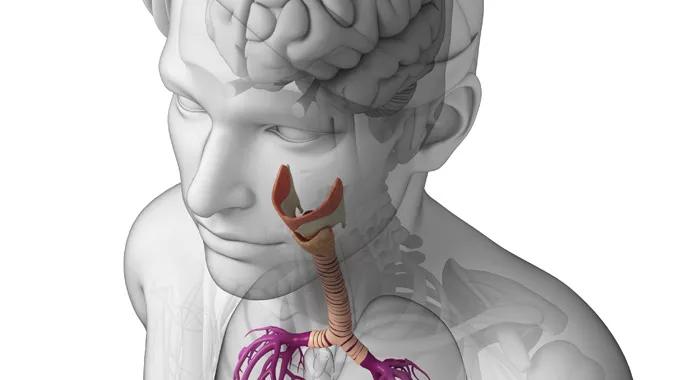How to talk to and treat them

Advertisement
Cleveland Clinic is a non-profit academic medical center. Advertising on our site helps support our mission. We do not endorse non-Cleveland Clinic products or services. Policy
Chronic cough has a variety of etiologies and is linked to increased morbidity and lower quality of life for patients, many of whom suffer for years without resolution of – or even an explanation for – their refractory cough. We have a multidisciplinary team that offers comprehensive pulmonary function testing and upper airway evaluation, gastrointestinal testing including acid reflux testing, behavioral cough suppression with speech therapy and allergy testing.
If none of these tests alert us to an underlying cause, we diagnose unexplained chronic cough (UCC).In almost all patients, UCC has a component of cough hypersensitivity syndrome (CHS), also known as sensory neuropathic cough. These patients have a laryngeal paresthesia and a heightened cough reflex with an increased sensitivity to thermal, mechanical and chemical triggers. Cold air is a common thermal trigger. Some patients are diagnosed with gastrointestinal acid reflux disease (GERD), when in fact their cough reflex is simply triggered by swallowing. Patients can experience severe paroxysms of coughing that induce syncope or emesis, greatly inhibiting their ability to perform their daily functions of life.
Patients with CHS can benefit from off-label use of neuromodulator therapies such as tricyclic antidepressants and gabapentin. We see some success in about two-thirds of patients with this method according to a study Paul Bryson, MD, MBA, and I conducted in 2019. Gabapentin has been shown to improve cough-specific quality of life in patients with refractory chronic cough, suggesting that central reflex sensitization is involved in this syndrome. The drawbacks to this treatment include tachyphylaxis and dependence. Educating patients about possible side effects and having a protocol to guide titration of therapy is essential. Equally important is early referral to a speech pathology specialist for behavioral cough suppression therapy.
Advertisement
In March 2021, a P2X3 receptor antagonist was submitted to the Federal Drug Administration for approval. Phase 3 COUGH-1 and COUGH-2 trial results show that the drug, gefapixant, improves quality of life scores and cough severity and frequency. Those of us who treat patients who have sometimes coughed for a decade without relief are optimistic about the availability of this treatment in as early as spring of 2022. This would be the first medication approved in decades for the management of chronic cough.
While being able to offer effective treatments is paramount, the communication skills that a physician employs during a visit with a patient with chronic cough are at least as critical to a successful outcome. Many of these patients have seen multiple specialists, suffered for years and had their concerns diminished. At the beginning of each visit, I let the patient talk, uninterrupted. I start with “Tell me about your cough from when it first started,” and resist the urge to interrupt with pointed questions that will get me to an answer more quickly.
When I do this, many patients will tell me that it’s the first time they felt that a provider listened to their concerns. Patients with chronic cough often have the perception that their concerns are invalid because “it’s just a cough” or that the cough is their fault. Uninterrupted listening is an excellent way to show empathy and validate the person’s experience as one that is real and extremely important to address. It’s also a great way to catch any common cause — asthma, GERD, etc. — that may have fallen through the cracks in prior visits.
Advertisement
I also make a point to manage expectations for patients. Many patients that we see in the Chronic Cough Clinic have been coughing for decades with no relief or answer. I emphasize that their condition is chronic and that we can try several approaches for symptom relief. Usually patients are grateful that someone has validated their concerns and can offer at least partial symptom resolution.
While UCC represents a fraction of patients who overall seek treatment for chronic cough, it accounts for the majority of our patient referrals. Our clinic has extensive experience in managing patients with conditions like UCC and is engaged in ongoing research to better define and treat the condition. Our hope is that continued advances in the field can bring increased relief to this subset of patients.
Dr. Taliercio directs the Chronic Cough Clinic and is staff in the Respiratory Institute.
Advertisement
Advertisement

Recent breakthroughs have brought attention to a previously overlooked condition

A review of treatment options for patients who may not qualify for surgery

Looking at the real-world impact and the future pipeline of targeted therapies

The progressive training program aims to help clinicians improve patient care

New breakthroughs are shaping the future of COPD management and offering hope for challenging cases

Exploring the impact of chronic cough from daily life to innovative medical solutions

How Cleveland Clinic transformed a single ultrasound machine into a cutting-edge, hospital-wide POCUS program

Collaborative patient care, advanced imaging techniques support safer immunotherapy management